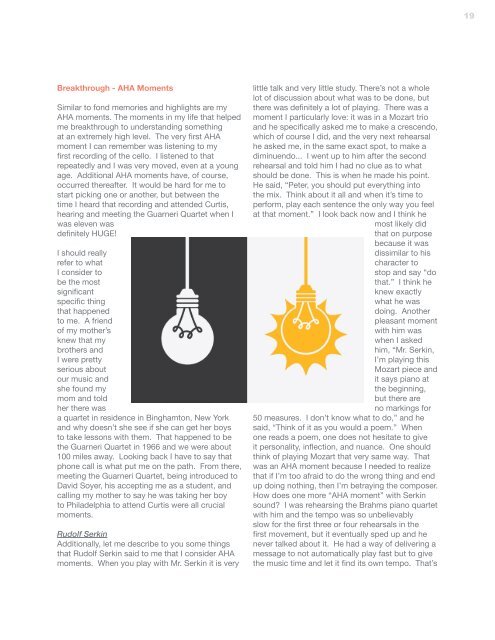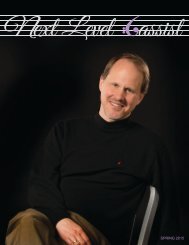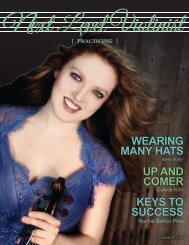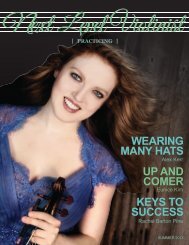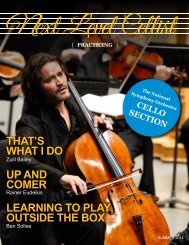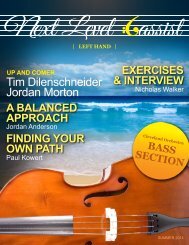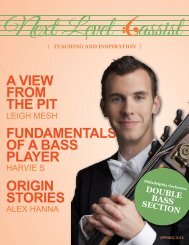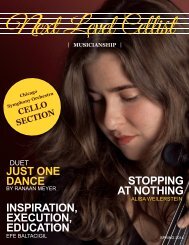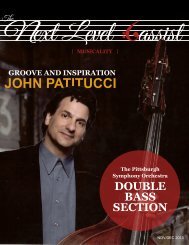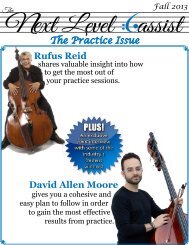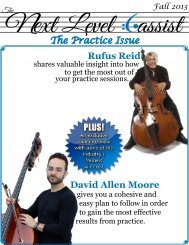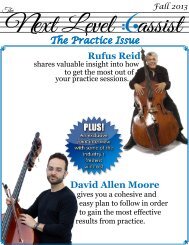Create successful ePaper yourself
Turn your PDF publications into a flip-book with our unique Google optimized e-Paper software.
19Breakthrough - AHA MomentsSimilar to fond memories and highlights are myAHA moments. The moments in my life that helpedme breakthrough to understanding somethingat an extremely high level. The very first AHAmoment I can remember was listening to myfirst recording of the cello. I listened to thatrepeatedly and I was very moved, even at a youngage. Additional AHA moments have, of course,occurred thereafter. It would be hard for me tostart picking one or another, but between thetime I heard that recording and attended Curtis,hearing and meeting the Guarneri Quartet when Iwas eleven wasdefinitely HUGE!I should reallyrefer to whatI consider tobe the mostsignificantspecific thingthat happenedto me. A friendof my mother’sknew that mybrothers andI were prettyserious aboutour music andshe found mymom and toldher there wasa quartet in residence in Binghamton, New Yorkand why doesn’t she see if she can get her boysto take lessons with them. That happened to bethe Guarneri Quartet in 1966 and we were about100 miles away. Looking back I have to say thatphone call is what put me on the path. From there,meeting the Guarneri Quartet, being introduced toDavid Soyer, his accepting me as a student, andcalling my mother to say he was taking her boyto Philadelphia to attend Curtis were all crucialmoments.Rudolf SerkinAdditionally, let me describe to you some thingsthat Rudolf Serkin said to me that I consider AHAmoments. When you play with Mr. Serkin it is verylittle talk and very little study. There’s not a wholelot of discussion about what was to be done, butthere was definitely a lot of playing. There was amoment I particularly love: it was in a Mozart trioand he specifically asked me to make a crescendo,which of course I did, and the very next rehearsalhe asked me, in the same exact spot, to make adiminuendo... I went up to him after the secondrehearsal and told him I had no clue as to whatshould be done. This is when he made his point.He said, “Peter, you should put everything intothe mix. Think about it all and when it’s time toperform, play each sentence the only way you feelat that moment.” I look back now and I think hemost likely didthat on purposebecause it wasdissimilar to hischaracter tostop and say “dothat.” I think heknew exactlywhat he wasdoing. Anotherpleasant momentwith him waswhen I askedhim, “Mr. Serkin,I’m playing thisMozart piece andit says piano atthe beginning,but there areno markings for50 measures. I don’t know what to do,” and hesaid, “Think of it as you would a poem.” Whenone reads a poem, one does not hesitate to giveit personality, inflection, and nuance. One shouldthink of playing Mozart that very same way. Thatwas an AHA moment because I needed to realizethat if I’m too afraid to do the wrong thing and endup doing nothing, then I’m betraying the composer.How does one more “AHA moment” with Serkinsound? I was rehearsing the Brahms piano quartetwith him and the tempo was so unbelievablyslow for the first three or four rehearsals in thefirst movement, but it eventually sped up and henever talked about it. He had a way of delivering amessage to not automatically play fast but to givethe music time and let it find its own tempo. That’s


